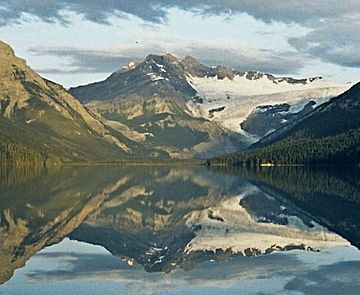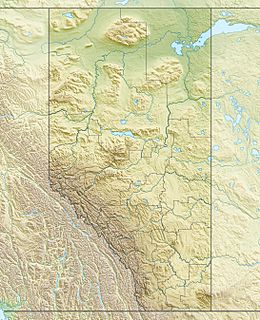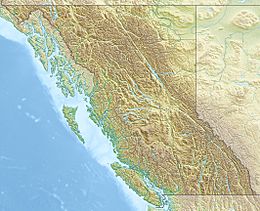Division Mountain facts for kids
Quick facts for kids Division Mountain |
|
|---|---|

Division Mountain reflected in Glacier Lake
|
|
| Highest point | |
| Elevation | 3,020 m (9,910 ft) |
| Prominence | 340 m (1,120 ft) |
| Parent peak | Christian Peak (3406 m) |
| Listing | Mountains of Alberta Mountains of British Columbia |
| Geography | |
| Country | Canada |
| Parent range | Canadian Rockies |
| Topo map | NTS 82N/14 |
| Climbing | |
| First ascent | 1918 by Interprovincial Boundary Commission |
Division Mountain is a cool peak in the Canadian Rockies. It sits right on the Continental Divide. This means it's on the border between Alberta and British Columbia in Canada. It also marks the edge where Banff National Park meets Kootenay National Park.
The mountain got its name in 1919 from Charles Doolittle Walcott. He named it "Division Mountain" because it separates two large icefields: the Lyell Icefield and the Mons Icefield.
How Division Mountain Was Formed
Division Mountain is made of sedimentary rock. This type of rock forms from layers of sand and mud. These layers were laid down over millions of years. This happened in shallow seas that once covered the area. The rock dates back to the Precambrian and Jurassic periods.
Later, during a time called the Laramide orogeny, huge forces pushed these rocks. They were pushed eastward and stacked up. This created the tall mountains we see today.
Weather at Division Mountain
The climate around Division Mountain is known as a subarctic climate. This means it has very cold and snowy winters. The summers, however, are usually mild.
In winter, temperatures can drop really low. It can be colder than -20 °C. When you add the wind, it can feel like -30 °C or even colder!
 | Lonnie Johnson |
 | Granville Woods |
 | Lewis Howard Latimer |
 | James West |



